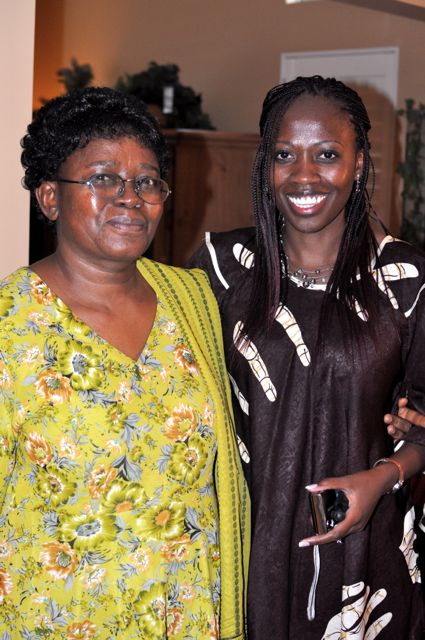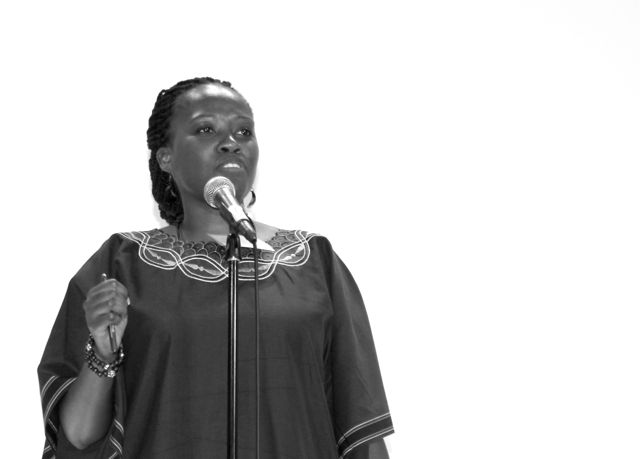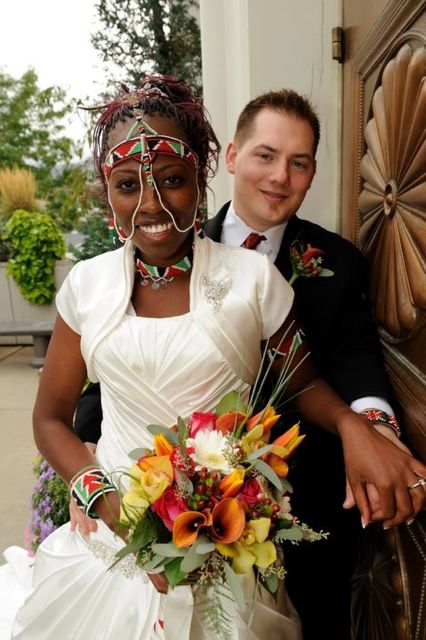Having suffered religious persecution and losing a parent at a young age, Seraphine Kapsandoy Jones has had her fair share of trials. But the 35-year-old native of Kenya says she doesn’t worry about things she can’t control. She focuses on her faith, goals, and opportunities to serve. Now, the doctoral student at the University of Utah helps inspire, empower, and motivate women to soar high.
You and your family were pioneers of the church in Kenya. Tell me about your family’s conversion.
I was born and raised in Nairobi, Kenya. My dad did his undergraduate and graduate studies in New Mexico, and when he returned to Kenya, he was a Mormon. I was seven and I didn’t know who Mormons were; we were raised Catholic. My mom was very religious, so converting was not an easy thing for her, but she saw how much the church changed my dad and that had a big impact on her decision to be baptized.
I got baptized when I was eight, in a pond with running water. It felt good. It felt cleansing. My elder sisters, Joyce and Sylvia, and my younger brother and sister, Samuel and Sariah, also joined the church. Since the church wasn’t registered in Kenya, we had church at home. We’d wake up and go to the living room. My dad administered the sacrament and one of us would give a talk. Those were our Sundays. It was fun.
Pretty soon, we started to have other people join. My dad tracked down other members of the church in the area. We formed a small branch and met at a house, and eventually the church got registered.
Was there much resistance to the church?
Other churches didn’t know much about Mormons. They did a good job of painting us as devil worshippers. In fact, we even made the front page of the national paper with the headline “Mormons: Devil Worshippers.”
I was the only Mormon in my all-girl’s Catholic high school and remember the vice principal calling me into her office and asking me what religion I was. I brought her an Ensign and Book of Mormon, and then all this drama started to brew because the church had just been registered and it was new and people had concerns. It was ridiculous the things they said about us. But Heavenly Father had prepared a way to deal with all the ridicule.
You told me your father passed away when you were young. How old were you?
I was 14, in the eighth grade. He was traveling to our farm in Kitale and a semi-truck hit his SUV.
Do you remember hearing the news?
Oh, yes, it’s burned in my mind. It was a Monday. I was at school. I saw my sisters coming to get me—and I thought that was strange, because my sisters never came to get me. There were all these cars in front of our house and in the back of my mind I knew what it was but I didn’t want to know. My mom was sitting on her bed with some women and she told me we lost a member of our family. I cooked up an idea of an aunt or uncle—it couldn’t be my dad. I will never forget that. Those were rough times.
What do you remember most about your father?
The biggest gift we got from my dad wasn’t the material possessions, it was the gospel. That’s been the foundation of everything. It keeps me propelling forward.
How did your father’s death affect your faith?
It changed me. I questioned a lot. And I had a lot of anger. At that age, nothing makes sense. It was only later in life that I began to understand.
My dad’s first goal was to get the church registered and his second goal was to get his family to the temple. By the time he died, the church was registered, but we hadn’t gone to the temple yet. We started saving money to make the trip to the Johannesburg South Africa Temple. We fasted and prayed and, though it seemed so impossible, we felt peace that everything would work out. Soon after, there was a Relief Society group in the U.S. that put money together to help us go to the temple. It was a miracle and answer to our prayers. Our family got sealed, and I think that’s when my faith really started to grow.
What kind of things did you learn from your mom growing up?
My mom taught us from an early age how to save our money. After my dad passed away, my mom had to occasionally travel up country to the farm to work and she’d give us 200 shillings while she was gone. I learned to stretch a shilling; she’d come back and I’d have change left.
When I came to the States, I read everything I could to learn about how to be financially savvy. My biggest motivating factor for being financially savvy was that I didn’t want to see my family suffer.
After high school, you went away to study nursing at Mississippi University for Women. What was that like?
The church isn’t very big in Columbus, Mississippi. They had only one ward, but it was comfortable and made me feel like I was back home. The church was the one thing that gave me comfort and peace. It’s interesting to see that Heavenly Father prepares you for everything. People will disappoint, that’s a guarantee, but the gospel will never disappoint. If you have that foundation of faith, you have something to fall back on to give you strength.
Tell me about your decision to come to Utah.
I moved to be with my sister and also pursue graduate studies at the University of Utah. Moving to Utah was hard. I felt like I was in a blender, and I still experience that. It was not only the gospel culture, it was the fact that I was coming from Africa to Utah—a very different culture. At first, this made dating pretty interesting. I’m pretty fiery sometimes—well, I don’t know whether to call it fiery or headstrong, but I know what I want and I don’t compromise on fundamentals. Being able to find someone I could relate to was hard. I prayed about it a lot. And I came to the conclusion that if it wasn’t meant to be, that I would be okay. But I wanted my life to count for something. I didn’t want to waste my life. So, I focused on the things I could control and my abilities. I asked myself, “How far can I soar?” They say the sky is the limit, and we are the only ones who put the limits on ourselves, so we need to test the boundaries.
I’m a problem solver. I went back to my patriarchal blessing a lot when things became blurry and confusing. It’s easy to make bad choices and you really have to have something to go back on to ground you.
Other than your patriarchal blessing, how did you survive those blurry or confusing moments?
Good friends. You’ve got to find those key friends you can stick with. Sometimes you’re not seeing straight and you need a different perspective.
And I prayed. I spent a lot of time with Heavenly Father. A lot of nights I would take personal inventory and do soul searching. In my prayers, I said, “You know what’s needed and you know the timing. So I leave this up to you.”
I also tried to live outside of myself because there’s so many things that need to be done and if you focus on those things, you get so much more out of life. Even meeting Matt, my husband, I wasn’t focused too much on getting married. I was focused on other things like my work and school and involvement in community. When he came along, I wasn’t even paying attention.
You’re very involved in the community. What all do you do?
I serve on the board of directors of Women’s World Health Initiative, a nonprofit dedicated to healthcare for women in Senegal. I’m in my last year of my PhD program. I also work at Intermountain Healthcare. I serve in Young Women’s in my ward. And do a lot of other projects on the side. Also, I’ve been married for more than two years.
What would your dream job be?
My dream is to start something that gives women [in Kenya] opportunity and choice and resources. When you teach a woman, you teach a family and a nation.
What do you wish more people knew about life in Kenya?
Life in Kenya is fun and very dynamic. The food is also fabulous.
Do you have a favorite African meal?
Sukuma wiki (kale), and pilau and chapati.
If you could give one piece of advice for women, what would it be?
Be strong. Know yourself. Know your value. Know that Heavenly Father is behind you. Nurture your value and never sell yourself short.
At A Glance
Seraphine Kapsandoy Jones
 Location: Salt Lake City, UT
Location: Salt Lake City, UT
Age: 35
Marital status: Married
Occupation: Cardiovascular Clinical Programs Manager at Intermountain Healthcare
Schools Attended: Mississippi University for Women; University of Utah
Languages Spoken at Home: English and Swahili
Favorite Hymn: “Oh My Father”
Interview by Katherine Peterson. Photos used with permission.
At A Glance



